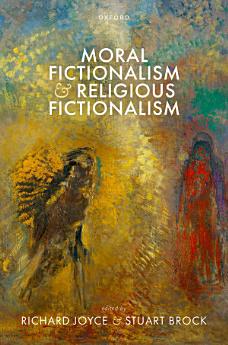Moral Fictionalism and Religious Fictionalism
Richard Joyce · Stuart Brock
Nob 2023 · Oxford University Press
E-book
272
Mga Page
family_home
Kwalipikado
info
reportHindi na-verify ang mga rating at review Matuto Pa
Tungkol sa ebook na ito
Atheism is a familiar kind of skepticism about religion. Moral error theory is an analogous kind of skepticism about morality, though less well known outside academic circles. Both kinds of skeptic face a “what next?” question: If we have decided that the subject matter (religion/morality) is mistaken, then what should we do with this way of talking and thinking? The natural assumption is that we should abolish the mistaken topic, just as we previously eliminated talk of, say, bodily humors and unicorns. The fictionalist, however, offers a less obvious recommendation. According to the fictionalist, engaging in the topic in question provides pragmatic benefits that do not depend on its truth-in a way roughly analogous to engaging with a novel or a movie. The religious fictionalist maintains that even if we were atheists, we should carry on talking, thinking, and acting as if religion were true. The moral fictionalist maintains a similar view regarding moral talk, thought, and action. Both forms of fictionalism face serious challenges. Some challenges can be levelled at either form of fictionalism (or at any form of fictionalism), whereas others are problems unique to moral fictionalism or to religious fictionalism. There are important questions to be asked about the relationship between these two kinds of fictionalism. Could moral fictionalism be plausible even if religious fictionalism is not (or vice versa)? This is a volume of thirteen previously unpublished papers on the topics of religious fictionalism, moral fictionalism, and the relation between these views.
Tungkol sa may-akda
Richard Joyce received his PhD from Princeton in 1998. Over the following years he held academic positions at the University of Sheffield, the Australian National University, and the University of Sydney, eventually taking up a professorship at Victoria University of Wellington in 2010. He is the author of Essays in Moral Skepticism (OUP, 2016), The Evolution of Morality (MIT Press, 2006), and The Myth of Morality (CUP, 2001). In addition, he has edited several collections and has published numerous journal articles and book chapters, largely in the areas of metaethics and moral psychology. Stuart Brock is a Professor of Philosophy at Victoria University of Wellington. He received his PhD from Princeton in 2002, and subsequently taught at Western Washington University. He has published numerous journal articles and book chapters on fiction and fictionalism. He is co-author of A Critical Introduction to Fictionalism (Bloomsbury, 2018) and Realism and Antirealism (Routledge, 2007) and co-editor of Fictional Objects (OUP, 2015).
I-rate ang e-book na ito
Ipalaam sa amin ang iyong opinyon.
Impormasyon sa pagbabasa
Mga smartphone at tablet
I-install ang Google Play Books app para sa Android at iPad/iPhone. Awtomatiko itong nagsi-sync sa account mo at nagbibigay-daan sa iyong magbasa online o offline nasaan ka man.
Mga laptop at computer
Maaari kang makinig sa mga audiobook na binili sa Google Play gamit ang web browser ng iyong computer.
Mga eReader at iba pang mga device
Para magbasa tungkol sa mga e-ink device gaya ng mga Kobo eReader, kakailanganin mong mag-download ng file at ilipat ito sa iyong device. Sundin ang mga detalyadong tagubilin sa Help Center para mailipat ang mga file sa mga sinusuportahang eReader.






